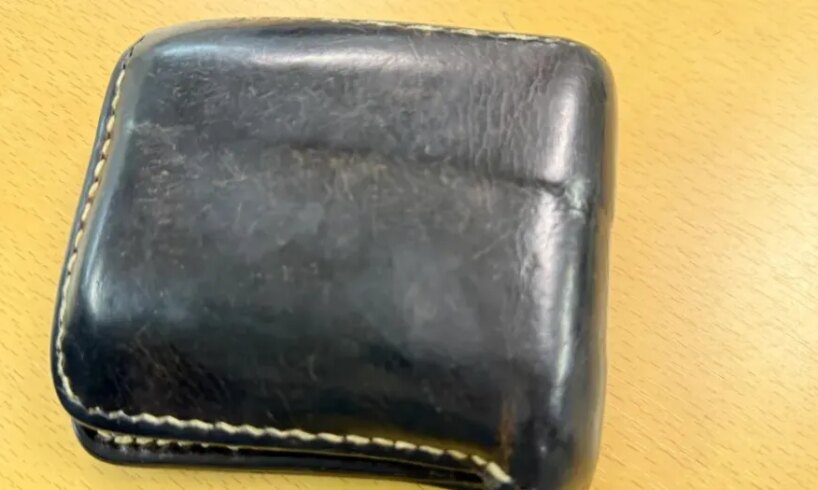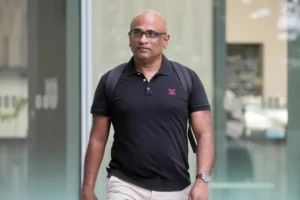
With no clear answers, it’s up to the wallet’s owner to choose what he wants to believe about the person who had it.
About a week ago, our Japanese-language reporter P.K. Sanjun was sitting at home when his phone rang at about 10 p.m. Surprised that someone would be calling instead of texting at that time, and not recognizing the number of the caller, he answered the call and tentatively said hello.
“This is Detective A from the Tokyo Metropolitan Police Z Precinct,” said the voice on the other end of the call (we’ve redacted the specific names for the sake of privacy). “We found your wallet.”
P.K. did indeed lose his wallet, but that was all the way back in mid-September. What’s more, since he usually keeps his wallet in his bag and uses his phone for so many of his payments, when he finally did reach for his wallet and discovered it was gone, a whole three days had passed since he last remembered seeing it. So even though he filed a missing property report with the police, he didn’t really expect to actually get it back. He wasn’t happy about losing the 20,000 yen (US$130) he’d had inside, but he’d managed to cancel his credit and ATM cards without anyone making unauthorized use of them. Getting his driver’s license and other forms of ID reissued had been more of a hassle, but he’d finally gotten everything sorted out, and by the time he got this phone call, he’d practically forgotten all about having lost his wallet.
▼ P.K. doesn’t have time to mope about losing his wallet when there’s rare Japanese-grown coffee to taste, among other things on his schedule.
Between how much time had passed since the incident and the hour of night at which the call came in, P.K. thought this might be a scam. “How can I know you really are who you say you are?” he asked. Detective A advised P.K. to take a look at the official website for the precinct he said he was calling from, where there’s a listed contact phone number, and to call it and ask to speak with Detective A. P.K. did that, and sure enough, the operator connected him to the same person, proving that Detective A was a legit law enforcement member.
With that settled, P.K. and the detective could discuss getting his wallet back to him. The detective asked P.K. to confirm his address and other particulars, and P.K. had a question for him too, asking where the police had found his wallet. “We found it at a private residence within our jurisdiction,” Detective A informed him. “We actually had an emergency call from another party saying that they’d been unable to get in contact with the resident and were worried about them. When we entered the home, we found your wallet, and also that the resident had passed away.”
P.K. was startled by this unexpected information, but the conversation didn’t go on much longer, as Detective A said that the precinct would be in touch again soon to determine a date for P.K. to come pick up his wallet. Three days later, he got another call, this time from a Detective B who confirmed, one by one, the contents of the wallet when it was found, and it turned out that each and every one of P.K.’s cards had been recovered. “I’m sorry to inform you that the cash was gone,” said Detective B. “I believe Detective A has already mentioned it, but the resident of the home where we found your wallet is deceased. So, will you be pressing charges?”
It took P.K. a moment to process that the detective was asking the question in earnest, and was waiting for his response. “Wait, you can file charges against someone after they’re dead?”, he asked in return. “Yes. The process is sort of involved, but it is possible,” Detective B explained.
Possible or not, P.K. had no intent of trying to get cash from a dead man. Actually, he was concerned about what had happened to him. “By the way, was this a suicide, or do you think there was some sort of foul play?” he asked, but all Detective B could tell him was “That’s part of an ongoing investigation.”
P.K. made an appointment to come to the police station and pick up his wallet two days from then, and after he checked in at the front desk, he was ushered into an interview room by a Detective C. Sitting on the desk waiting for him was his wallet, and after they confirmed its contents, yet another detective, Detective D, came in carrying a thick folder. “The deceased resident of the home where we found your wallet was a Sri Lankan national,” said Detective D as he opened up the folder to a page with a photocopy of a foreign resident ID card. “Do you remember having seen or met this person before?”
P.K. looked at the photo on the card, which showed a man with long hair and glasses who appeared to be about 30 years old. P.K. had never seen him before in his life.
“I see,” said Detective D when P.K. told him, and he then closed up the folder and left the room.
As Detective C was wrapping up the paperwork, P.K. took the opportunity to ask a few more questions, starting with “Did you find any other missing wallets in the residence?” “No, just yours.” the detective answered. “It was sitting inside the entryway.” He then made an observation that made P.K. feel hollow in a way far beyond the simple 20,000 yen he’d lost.
“If we’d found your wallet, say, hidden inside the deceased’s bag, then we’d definitely suspect him of having stolen it. But having it just sitting in the entryway like that, it’s possible that he was planning to return it to you.”
P.K. also asked again if they’d figured out what had happened to the guy, but was told that the cause of death was currently undetermined.
As he left the building with his wallet back in his bag, P.K. struggled to sort out his emotions. Yes, his wallet had been missing, but he hadn’t been mugged. It’s possible that someone stole it out of his bag, but it’s also possible that he accidentally dropped it or left it somewhere while he was out. And yes, when the police had found it the cash that was inside was gone, but that doesn’t necessarily mean the Sri Lankan man had taken it. It’s possible that he’d found P.K.’s wallet after someone else had pocketed the cash, but figured that the rightful owner would still want the wallet itself and cards it contained back, but hadn’t been able to start the process of returning it before his life ended.
It’s unlikely that P.K. will ever conclusively know how or why his wallet ended up in the Sri Lankan man’s home, and precisely because he’ll never know, he has to decide for himself what to believe. He’s choosing to have faith and believe that the man was trying to do the right thing and return his wallet, and so while he’ll never have the chance to tell him in-person, P.K. wants to say thank you, and hopes that he’s resting in peace.
If you or someone you know is in Japan and having suicidal thoughts, there are people here to help. Click here for more info.
Top image ©SoraNews24
Insert images: SoraNews24, Pakutaso
● Want to hear about SoraNews24’s latest articles as soon as they’re published? Follow us on Facebook and Twitter!
[ Read in Japanese ]
Like this:
Like Loading…





